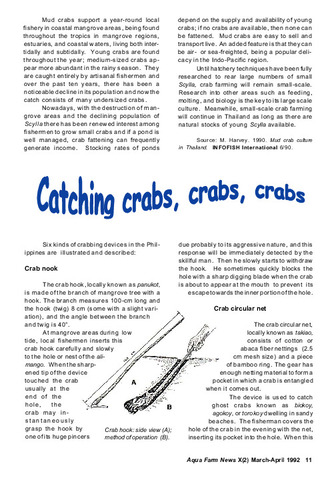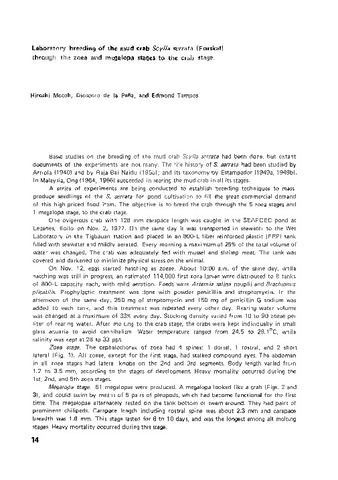Status of mud crab industry in Thailand
- Global styles
- MLA
- Vancouver
- Elsevier - Harvard
- APA
- Help

ดู/
วันที่
2015ผู้เขียน
Page views
4,098ASFA keyword
AGROVOC keyword
เมตาดาต้า
แสดงระเบียนรายการเต็ม
Share
นามธรรม
Mud crab is an economically important crustacean commodity in Thailand due to its high nutritional and market value. All the four species of mud crab, Scylla paramamosain, S. olivacea, S. serrata and S. tranquebarica are found in Thailand. The production areas are along the coasts of Gulf of Thailand where S. paramamosain or white mud crab is abundant, and Andaman Sea where S. olivacea or black mud crab is dominant. Data from the Thai Department of Fisheries estimated that the total mud crab production in 2010 was 2,130 mt valued at Baht 322.7 million (US$10.84 million). In the last decade, the production from coastal aquaculture was 6,921 mt valued at Bath 491.4 million (US$16.51 million). The probable cause of the decrease in production is the over exploitation of the wild population.Mud crab culture systems commonly practiced are grow-out (culture from juveniles to market size crabs in ponds), fattening of lean crabs and production of soft-shell crabs. In the past, seedstocks for grow-out culture were collected from the wild. Recently, both wild and hatchery-reared seedstocks are being utilized for farming. Mud crabs for fattening and production of soft-shell rely mainly on wild resources. All culture practices are considered extensive or semiintensive except for soft-shell crab farming which is intensive.The current research and development activities include broodstock and seed production techniques, and formulated feed production. Further technical and financial support are required to improve the survival and production of mud crab. Likewise, support for the transfer of technology to farmers is needed. The lack of seed supply is a major issue facing the mud crab industry in Thailand. A few mud crab hatcheries, which belong to the government, have been established. It is becoming difficult to collect ovigerous females from the wild. Hence, most females are obtained from ponds. Collection of ovigerous females in the wild is prohibited from October to December. Restocking of mud crabs in the natural habitat has become a routine activity to increase the resources.
การอ้างอิง
Nooseng, S. (2015). Status of mud crab industry in Thailand. In E. T. Quinitio, F. D. Parado-Estepa, Y. C. Thampi Sam Raj, & A. Mandal (Eds.), Proceedings of the International Seminar-Workshop on Mud Crab Aquaculture and Fisheries Management, 10-12 April 2013, Tamil Nadu, India (pp. 37-43). Tamil Nadu, India: Rajiv Gandhi Centre for Aquaculture (MPEDA).
Type
Conference paperISBN
9788192989815
Related items
Showing items related by title, author, creator and subject.
-
Catching crabs, crabs, crabs
Castaños, Milagros T.; Southeast Asian Fisheries Development Center, Aquaculture Department (Aquaculture Department, Southeast Asian Fisheries Development Center, 1992) -
Laboratory breeding of the mud crab Scylla serrata (Forskal) through the zoea and megalopa stages to the crab stage
Motoh, Hiroshi; de la Peña, Dioscoro; Tampos, Edmond (Aquaculture Department, Southeast Asian Fisheries Development Center, 1977)A series of experiments is being conducted to establish breeding techniques to mass-produce seedlings of S. serrata for pond cultivation to meet the commercial demand for the crab. The objective is to culture the crab ... -
Series: Aquaculture extension manual; No. 61
Soft-shell crab production using hatchery-reared mud crab
Tobias-Quinitio, Emilia J.; Libunao, Gardel Xyza S.; Parado-Estepa, Fe D.; Calpe, Adelaida T. (Aquaculture Department, Southeast Asian Fisheries Development Center; Philippine Council for Agriculture, Aquatic and Natural Resources Research and Development (PCAARRD), 2015)"The production of soft-shell crabs is well established in other Asian countries but its sustainability is already being threatened due to the decreasing mud crab population in the wild where the seedstocks are sourced. ...




